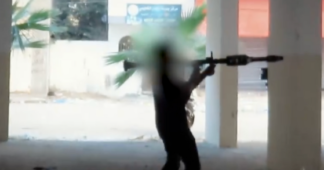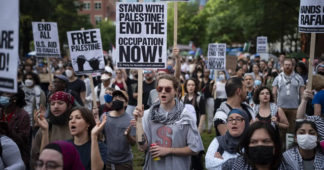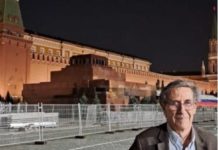Middle East professors at Israel’s top universities openly justify starving Gaza civilians to pave way for the army’s military campaign
By Nadav Rapaport
Oct 14, 2024
Uzy Raby, a history professor, has been one of the most sought-after Middle East experts in Israeli media.
The senior lecturer at the department of Middle Eastern and African history at Tel Aviv University has unapologetically advocated the starvation of civilians in northern Gaza who do not follow the Israeli army’s order to evacuate south.
“Anyone who stays there will be judged by law as a terrorist and will go through either a process of starvation or a process of extermination,” he said during a TV interview last month.
Then, addressing a possible attack on Beirut, he reiterated the same reasoning.
“You have to inflict it [the war] on the population,” Raby said.
According to Assaf David, co-founder of the Forum for Regional Thinking and head of the Israel in the Middle East Cluster at the Van Leer Jerusalem Institute, Raby and others like him “are more militant even than the military-security establishment currently leading Israel’s war”.
Evidence for that can be found in the support some of them gave to the plan of former senior Israeli officer Giora Eiland.
The plan called for forcibly displacing all civilians from the northern part of the enclave, or subjecting them to starvation and military force, which in the view of critics may amount to ethnic cleansing and genocide.
‘Occupy Gaza now’
Israeli Middle East scholars have always been rather conservative on Israeli-Palestinian and regional issues, said David.
But since the war began in October 2023, some of them have espoused far-right discourse, similar to the extremist views of Israel’s most far-right ministers, Itamar Ben Gvir and Bezalel Smotrich.
Dr Harel Chorev is another Middle Eastern lecturer at Tel Aviv University who advocated the Eilan plan. He told Channel 13 that he would “sign with both hands” on the plan, as it is consistent with his own plan for Gaza.
In March, Chorev called for a military operation in Rafah despite US objections. “Rafah must be conquered,” he told Maariv newspaper.
Professor Eyal Zisser, Tel-Aviv University vice rector and member of the Middle East department, has called on the Israeli military to “occupy Gaza now.”
In June, Professor Benny Morris, one of the leading scholars of the Israeli-Palestinian conflict and member at the Middle East department at Ben-Gurion University, shockingly called for Israel to drop a nuclear bomb on Iran.
Apart from urging for more potential war crimes and for the occupation of the Gaza Strip, these academics are additionally advancing a seemingly dehumanisation campaign against Palestinians, Arabs and Muslims.
According to Yonatan Mendel, a lecturer at the Middle East department of Ben-Gurion University of the Negev, Israeli academics have uncritically sought to mobilise the public behind the army’s devastating campaign in Gaza.
“The voice heard by Middle East scholars almost always did not challenge the general public’s thought in Israel,” he told MEE.
“Since the war began, the discourse in the Israeli media has been greatly limited. The discourse revolved around ‘together we will win’ and saw Israel’s very harsh military response as the only thing that could and should be done,” Mendel said.
A week after the war began, Raby said that the rules that apply to the West should not apply in the Israeli-Palestinian conflict.
“When… you try to solve Middle Eastern problems in western terms – you will fail,” he said.
Last month Raby suggested Israeli actions should be flavoured with a special “Middle Eastern spice”. Like Raby, Chorev said that things should be done differently in the Middle East.
‘No innocent civilians’
“Some of these experts believe that ‘Israel should be proud of the fact that it is not a western liberal democracy,” said David. “They want Israel to join the Middle East, but to the authoritarian order of the region, since they think it is the only way Israel can survive in the region,” he added.
According to Mendel, this rhetoric is represented by prominent commentator, Eliahu Yusian, a self-proclaimed expert on Middle East issues, who is saying that there are “no innocent” civilians in Gaza.
“The establishment wanted to hear a voice [like Yusian’s] saying: ‘They are barbarians. We should be barbarians like them’,” said Mendel.
Professor Avi Bareli, a lecturer on Israel and the history of Zionism at Ben-Gurion University, wrote last October that the Palestinians are “a society that worships death and raises the banner of murder”.
There are other voices in Israeli Middle East academia, but “regrettably they are marginal and marginalised”, according to David.
David argues that at least in part “some of them self-censor themselves and choose not to criticise Israel’s political and military moves against the Palestinians and their colleagues’ statements.”
Indeed, non-mainstream voices in Israeli universities are under severe scrutiny.
Since the onset of the war, over 160 Palestinian students and several faculty members faced disciplinary actions from their institutions for statements suspected of supporting Hamas or the Palestinian struggle, according to a report by Academia for Equality, a group working to promote democratisation, equality and access to the higher education system.
“Israeli academia in general and Middle Eastern studies in particular should have given a much greater counterpoint to the narrow view of the government: that Israel has no responsibility for what happens in the West Bank and Gaza and that the only way to solve its political problems in the region is by using the army,” Mendel said.
We remind our readers that publication of articles on our site does not mean that we agree with what is written. Our policy is to publish anything which we consider of interest, so as to assist our readers in forming their opinions. Sometimes we even publish articles with which we totally disagree, since we believe it is important for our readers to be informed on as wide a spectrum of views as possible.











